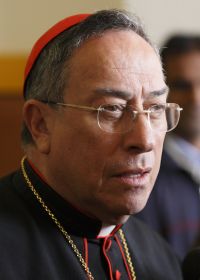VATICAN CITY (CNS) — The economy is a human creation, not a god, so humans have the responsibility to manage the economy in a way that benefits the most people, said Honduran Cardinal Oscar Rodriguez Maradiaga, president of Caritas Internationalis.
“The economy is not a god. We have to have the courage to put it in its place,” the cardinal said Feb. 12 at a presentation of the book, “Pope Francis: This Economy Kills,” by Italian journalists Andrea Tornielli and Giacomo Galeazzi.
The title is a provocative take on a line from the pope’s apostolic exhortation, “Evangelii Gaudium,” which says: “Just as the commandment ‘Thou shalt not kill’ sets a clear limit in order to safeguard the value of human life, today we also have to say ‘thou shalt not’ to an economy of exclusion and inequality. Such an economy kills.”
The book includes an interview with Pope Francis responding to accusations that he is a Marxist or a communist because of his insistence that the economy, finance and free market must be controlled to ensure a greater distribution of the world’s wealth. A portion of the interview was published Jan. 11.
“I did not say anything that is not in the social teaching of the church,” he said in the full interview. “What is more, I did not write from a technical point of view. I tried to describe what is happening.”
[hotblock]
“When money, instead of man, is at the center of the system, when money becomes an idol,” the pope said, “men and women are reduced to simple instruments of a social and economic system, which is characterized — or better yet, dominated — by profound inequalities.”
Pope Francis had particularly harsh words for what is known as “trickle-down economics” or the “trickle-down theory,” which holds that giving big businesses tax breaks and other benefits will generate income and jobs that, in the end, benefit the middle-class and the poor.
“The promise was that when the glass became full, it would spill over and the poor would benefit,” he said in the interview. “But, instead, when it was full, the glass magically got bigger and nothing trickled down to the poor.”
As he has said in the past, Pope Francis told Tornielli and Galeazzi that he has met “many good Marxists,” so he is not offended by accusations that he is one of them, “but the Marxist ideology is wrong.”
Catholic social teaching — like the homilies of the early Fathers of the Church on the virtue of simple living and the obligation to share with the poor — “is far from any political interest or any ideology,” the pope said. “It is motivated only by the words of Jesus who wants to offer his contribution to building a world where people protect and care for one another.”
Cardinal Rodriguez Maradiaga said for years, even decades, people have been telling him that priests should stay in the sacristy and keep their noses out of discussions about the economy. But, he said, as a pastor who deals daily with people suffering the impact of poverty, he felt an obligation to study economics.
Even pastors who have not done formal studies in economics know the social teaching of the Catholic Church and know that every human activity, including economic activity, has a moral and ethical dimension, he said.
[hotblock2]
“Catholics need to find the strength at least to raise questions about the current system, which is based on the excessive power of finance,” he said. “If the economy is for the human person and it’s not working, then it must change. But the voice of the people must call for it.”
The cardinal asked how much sense it made that the top officers of the banking and finance companies generally held to be responsible for triggering the current economic crisis were allowed to retire comfortably and are “playing golf,” while millions of people cannot afford a home.
Cardinal Rodriguez Maradiaga also criticized the austerity programs imposed on Greece and other struggling European countries by the International Monetary Fund, the European Commission and the European Central Bank.
“‘Austerity’ is a Christian virtue, a virtue we all must have,” he said. But the cuts in social services and the increased taxes some countries are forced to impose are “harsh measures that impact the poor most of all.” While the “macroeconomic status” of those countries improved with the measures, he said, “the middle class has almost disappeared.”
Countries with a striking and growing inequality between rich and poor are countries that experience social strife and even violence, he said, adding that is dangerous.
“The cry of the pope — and that is what it was, a cry” — was not motivated by ideology or by mistrust of people with money, Cardinal Rodriguez Maradiaga said, but by an obligation to “warn people that this economy can kill.”
PREVIOUS: Pope opens cardinals’ discussion of Curia reform; new offices explained
NEXT: Church’s new cardinals called to love and patience



Share this story